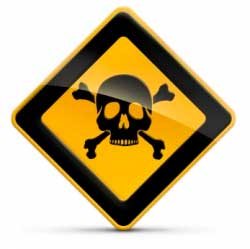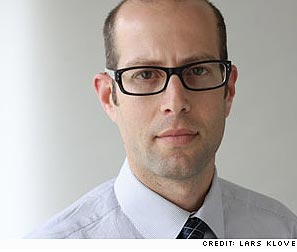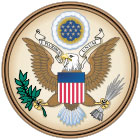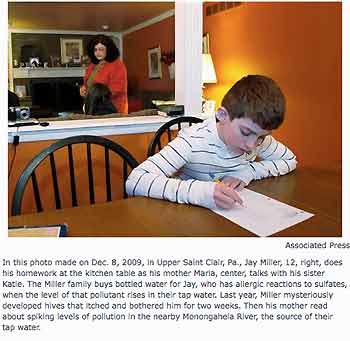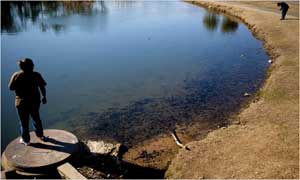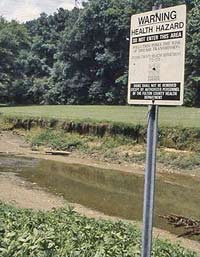Biblio
"TakePart.com is an independent online community that connects its members directly to the issues that inspire them to engage, contribute and take action. Our team of editors, writers, and researchers curate and deliver actions in context with in-depth primers to the social, environmental, political and cultural issues of our day.
Our growing global community includes citizens, activists, and large and small non-profits. We invite local and community groups to interact, explore issues, share resources, develop campaigns and use our platform to promote the causes they care most about."
Abrahm Lustgarten
Gas drilling companies such as Halliburton say the gas drilling technique known as hydraulic fracturing, or "fracking," is safe, but opponents contend it pollutes groundwater with dangerous substances. Now, new evidence has emerged possibly linking natural gas drilling to groundwater contamination.
ProPublica journalist Abrahm Lustgarten reports federal officials in Wyoming have found that at least three water wells contain chemicals used in hydraulic fracturing.
Abrahm Lustgarten is a former staff writer and contributor for Fortune, and has written for Salon, Esquire, the Washington Post and the New York Times since receiving his master's in journalism from Columbia University in 2003.
The Safe Drinking Water Act (SDWA 1974) is the principal federal law in the United States that ensures safe drinking water for the public. Pursuant to the act, the Environmental Protection Agency (EPA) is required to set standards for drinking water quality and oversee all states, localities, and water suppliers who implement these standards.
SDWA applies to every public water system in the United States. There are currently more than 160,000 public water systems providing water to almost all Americans at some time in their lives. The Act does not cover private wells.
In 1996, Congress amended the Safe Drinking Water Act amendments to emphasize sound science and risk-based standard setting, small water supply system flexibility and technical assistance, community-empowered source water assessment and protection, public right-to-know, and water system infrastructure assistance through a multi-billion-dollar state revolving loan fund. They were signed into law by President Bill Clinton on August 6, 1996.
See: Safe Drinking Water Act 101 | Online Training | Drinking Water Academy
Please note that information taken from Wikipedia should be verified using other, more reliable sources. It is a good place to start research, but because anyone can edit Wikipedia, we do not recommend using it in research papers or to obtain highly reliable information.
February 02, 2010. Cleveland Plain Dealer.
A drilling technique that is beginning to unlock staggering quantities of natural gas underneath Appalachia also yields a troubling byproduct: powerfully briny wastewater that can kill fish and give tap water a foul taste and odor.
With fortunes, water quality and cheap energy hanging in the balance, exploration companies, scientists and entrepreneurs are scrambling for an economical way to recycle the wastewater.
The Miller family buys bottled water for Jay, who has allergic reactions to sulfates, when the level of that pollutant rises in their tap water. Last year, Miller mysteriously developed hives that itched and bothered him for two weeks. Then his mother read about spiking levels of pollution in the nearby Monongahela River, the source of their tap water.
See: Urbina, Ian. “Regulation Is Lax for Water From Gas Wells.” The New York Times 26 Feb. 2011. Web. 27 Feb. 2011.
See: With Natural Gas Drilling Boom, Pennsylvania Faces an Onslaught of Wastewater
See: Do the natural gas industry’s surface water withdrawals pose a health risk?
The estimated population of Pulteney is about 1,300.
At times Sunday it looked like every one of them was crowded into the Pulteney Fire Hall to discuss the proposed plan to deposit contaminated wastewater in a former natural gas well.
More than 300 people came to hear a panel discuss the plan. Chesapeake Energy approached Pulteney officials last fall about the plan to dump the wastewater, which is generated from the hydrofracking process, into a well about a mile west of Keuka Lake.
Thousands of the nation’s largest water polluters are outside the Clean Water Act’s reach because the Supreme Court has left uncertain which waterways are protected by that law, according to interviews with regulators.
As a result, some businesses are declaring that the law no longer applies to them. And pollution rates are rising.
Companies that have spilled oil, carcinogens and dangerous bacteria into lakes, rivers and other waters are not being prosecuted, according to Environmental Protection Agency regulators working on those cases, who estimate that more than 1,500 major pollution investigations have been discontinued or shelved in the last four years.
The Clean Water Act was intended to end dangerous water pollution by regulating every major polluter. But today, regulators may be unable to prosecute as many as half of the nation’s largest known polluters because officials lack jurisdiction or because proving jurisdiction would be overwhelmingly difficult or time consuming, according to midlevel officials.
“We are, in essence, shutting down our Clean Water programs in some states,” said Douglas F. Mundrick, an E.P.A. lawyer in Atlanta. “This is a huge step backward. When companies figure out the cops can’t operate, they start remembering how much cheaper it is to just dump stuff in a nearby creek.”

See: PBS Frontline: "Poisoned Waters"
See Video report: "Supreme Court Restricts Clean Water Act". | Mixplex
See: Kid's view of a local water-quality problem
Students in the Atlanta and Columbus, Ga. area formed The River Kids Network, which tests and cleans up local streams (wearing gloves and boots, of course). Is there an organization in your area that does similar work?
Here are some 3rd graders' observations during a recent creek cleanup:
Not safe, even for bugs
"It's not looking so good. Raw sewage is in the Chattahoochee River, and not many critters can survive there. If bugs can't survive in there, what are humans going to do?"
Just a little effort
"I would just like the river to be clean enough so I could splash around and maybe drink some water. It wouldn't be very hard to make a difference."
Had it up to here
"The problem is that there are sewage leaks going to the creek and the creek goes into the big river. Everyone should help. If everyone helped, you could see right down to the bottom of the creek."
Out from under cover
"I want to play in the creek and not have to wear gloves and boots."
Signs of life are few
"On our monthly trips, we've found a lot of trash, including more than 18 tires, a radio, shoes and plastic bags. We've only found a few forms of life. We saw one turtle and a few bugs, but not many fish."
Jane Park.
Interview with blogger Elizabeth Berkowitz.
Cindy Kalbach and her husband have lived in Gaines for 10 years, enjoying the quiet wilderness. But that's become a lot harder because of increasing drilling activity. With wells as close as a mile away, trucks from gas companies are ravaging their roads, kicking up dust, driving away wildlife and keeping the Kalbachs indoors. Kalbach refuses to lease her land to gas companies, but some of her neighbors haven't been able to resist the offers. People around here are very low income. They just want to live here in peace, you know? And that's a lot of money to them. they don't realize what they're getting into,said Kalbach. Kalbach took her concerns to Elizabeth Berkowitz, an avid blogger who started Faces of Frackland to give a voice to people who feel like no one is listening.
Dave McMahon is a lawyer who wrote the West Virginia Surface Owner’s Guide to Oil and Gas.
According to this website, he will respond to an e-mail, or spend 5 minutes or so with anyone who calls on the phone with a question about their individual problem, and perhaps refer them on to a private lawyer for representation. See an example Gas Lease Checklist here.
Includes high-resolution image of a frack site. Permission to use may be obtained from WVSORO.
WORC is a regional network of seven grassroots community organizations that include 10,000 members and 45 local chapters. WORC helps its member groups succeed by providing training and coordinating issue work.
Our Member Organizations are:
- Dakota Rural Action
- Dakota Resource Council
- Idaho Rural Council
- Northern Plains Resource Council
- Oregon Rural Action
- Powder River Basin Resource Council
- Western Colorado Congress
WORC’s mission is to advance the vision of a democratic, sustainable, and just society through community action. WORC is committed to building sustainable environmental and economic communities that balance economic growth with the health of people and stewardship of their land, water, and air resources.
See: Group: Survey shows ill health in Wyoming 'fracking' zone
Powder River Basin Resource Council and EARTHWORKS release a survey showing residents report respiratory problems from gas drilling. (Casper Star-Tribune, August 19, 2010)
WASHINGTON COUNTY, PA - At first, farmer Ron Gulla and horse farm owner Joyce Mitchell were excited about the prospect of making money from gas drilling. Now, after more than two years of the presence of drilling companies with their heavy trucks and huge drill rigs, they and many of their neighbors wish they had never signed a lease.
Gasses bubbling out of the ground and into drinking wells and ponds. Before drilling is begun, a landowner should have the water tested for baseline items, he said. “The only problem is that such tests can be very costly.”
The National Children’s Study will examine the effects of the environment, as broadly defined to include factors such as air, water, diet, sound, family dynamics, community and cultural influences, and genetics on the growth, development, and health of children across the United States, following them from before birth until age 21 years.
The goal of the Study is to improve the health and well-being of children and contribute to understanding the role various factors have on health and disease. Findings from the Study will be made available as the research progresses, making potential benefits known to the public as soon as possible.
Ultimately, the National Children’s Study will be one of the richest research efforts geared towards studying children’s health and development and will form the basis of child health guidance, interventions, and policy for generations to come. For more details on the Study, see the Study Overview.
Watch this video and learn more about the Study.
See: Fracking: Implications for Human and Environmental Health
See: Living Downstream: An Ecologist's Personal Investigation of Cancer and the Environment
See: Poisoned profits : the toxic assault on our children
See: The Case for a Truth and Reconciliation Commission on Toxic Hazards
New York Department of Environmental Conservation (NYDEC). Information from DEC with links to other legal issues.
See: Landman Report Card
- 'Sunlight is said to be the best of disinfectants.'
- -- U.S. Supreme Court Justice Louis Brandeis
- 'Secrecy is the badge of fraud'
- -- Sir John Chadwick (b. 1941), British judge
- 'Every thing secret degenerates, even the administration of justice; nothing is safe that does not show how it can bear discussion and publicity.'
- -- Lord Acton (1834-1902), English historian
- 'The first principle of a free society is an untrammeled flow of words in an open forum.'
- --Adlai Stevenson (1900-1965), American statesman
- 'Give me the liberty to know, to utter, and to argue freely according to conscience, above all liberties.'
- --John Milton (1608-74), English poet
BAN is the world's only organization focused on confronting the global environmental injustice and economic inefficiency of toxic trade (toxic wastes, products and technologies) and its devastating impacts.
Working at the nexus of human rights and environment, we confront the issues of environmental justice at a macro level, preventing disproportionate and unsustainable dumping of the world's toxic waste and pollution on our global village's poorest residents.
At the same time we actively promote the sustainable and just solutions to our consumption and waste crises -- banning waste trade, while promoting green, toxic free and democratic design of consumer products.
BAN is a 501(c)3 charitable organization of the United States, based in Seattle, Washington
BAN leaked the Summers Memo in 1991 that Summers signed while he was Chief Economist of the World Bank.
Hydraulic Fracturing involves dumping millions of gallons of toxic slaine brine whose ingredients remain a trade secret due to monitoring exemptions granted by the 2005 Energy Policy Act.
See: Jennifer Clapp. (2010). Toxic Exports: The Transfer of Hazardous Wastes from Rich to Poor Countries. Cornell Univ Press. 2010.
See: Gas Drillers Plead Guilty to Felony Dumping Violations
See: Tragedy of the Commons | Mixplex
See: Barlow, Maude. Blue Covenant: The Global Water Crisis and the Coming Battle for the Right to Water. The New Press, 2009.






